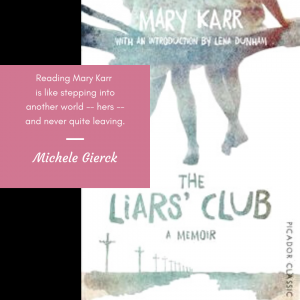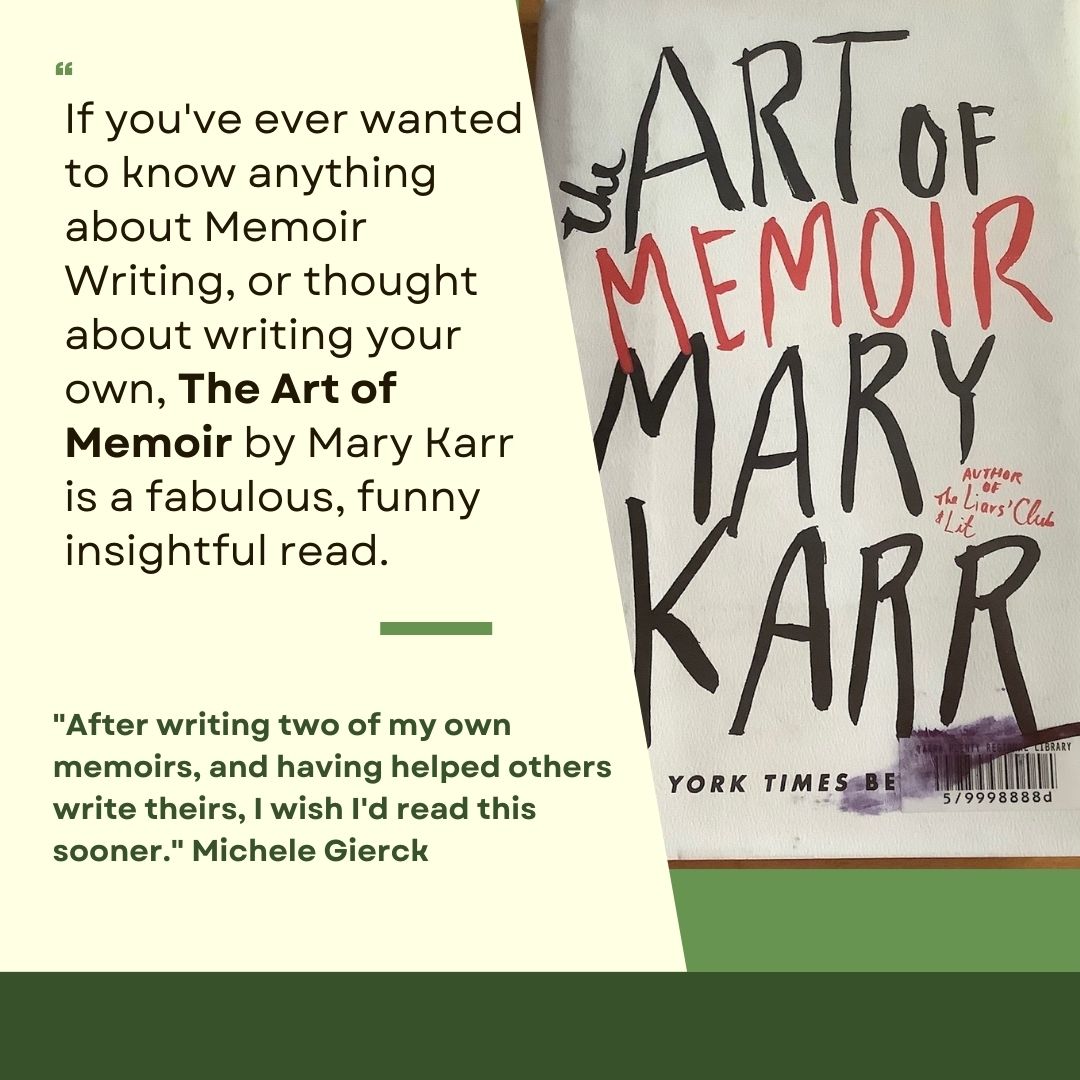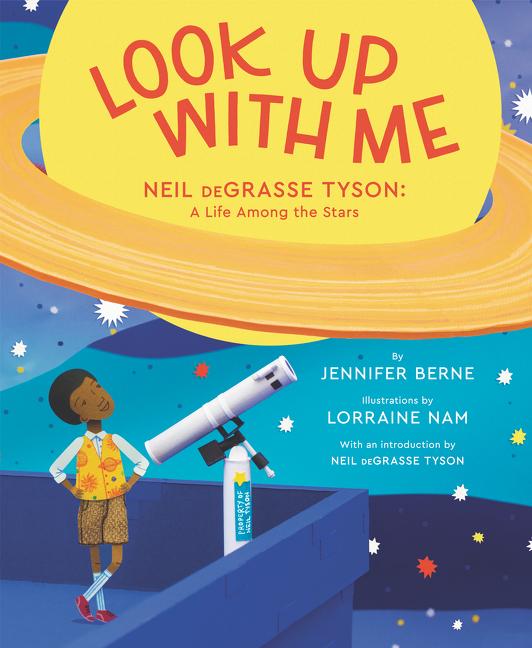
Personal writing is rarely just about the end product. It's a process. And that process can be a real gift, requiring deep thought and reflection. Yes, it often comes with challenges and surprises, but it's a bit like going fishing. You never know what you're going to find. (Or what finds you!) Even the difficult parts of life, when written about, take on different hues, and allow you to look from a different perspective.
My two memoirs have been about powerful personal experiences: one in a war zone, the other accompanying my mother with dementia. I might have thought I was writing about human rights, or breaking down barriers about dementia. But looking back, I realise I was just trying to make sense of it all -- of the madness of life.
That's why I encourage people who are thinking about writing -- perhaps daring themselves to give it a go -- to dive in. It's not so much the end product as the process of writing that's the real gift.
Over the years I've been contacted by quite a few people wanting to write part of their own story, but wondering where to start. Here's my suggested strategy -- three questions to ask yourself.
- If you were to choose six parts of your life to write about (they could be events, experiences, life stages, transitions, or times when you learnt something significant) what would they be?
- Why do you now feel the urge to write? Is it because you promised yourself you would before your turned, 30, 50 or 75? Perhaps you want to hand stories down to family members. Or to reflect on your journey so far? Is it to tell the story of others through your own eyes? Or to let your creative self flourish and see what emerges?
- Who would you like the audience for your writing to be? Are you writing for anyone in particular? Or just for yourself? Would you like your prose or poetry to be published?
Once you've answered the questions, start thinking about those six things you've chosen to write about. Then pick up a pen or tap away at the keyboard. It's fine to only write a paragraph on each. Or pages.
Then put it all down and leave it for a bit. Unless you just can't stop writing. Then, come back to what you've written. Is there one part that stands out? Is there a common thread? What would you like to replace or add?
This might give you an idea of what you really want to write about. Or at least give you a starting point.
And remember, rather than pressuring yourself to write a bestseller, write with freedom. No one is watching.
You never quite know what's going to happen once you start on your own personal writing adventure. Be brave, be creative, and allow the story to emerge.
Go for it!
Michele
ps for those who say they can't write, then speak it, record it, and get hold of some technology that can type it for you.
Michele's
website
Michele at
LinkedIn
Text and Image © Michele Gierck
Photo at Peggy's Cove, Canada



 I happened to discover this wonderful book, published in 2015, in the it's-yours-for-free box at the local library. Just proves that one library's trash is another person's treasure.
Here's one of my favourite quotes. 'In fact, every memoirist I know seems doomed to explore the past in an often-agonized death march down the page.'
Hope you get a chance to at least read the Preface. It's a classic.
Happy reading,
Michele
www.michelegierck.com.au
I happened to discover this wonderful book, published in 2015, in the it's-yours-for-free box at the local library. Just proves that one library's trash is another person's treasure.
Here's one of my favourite quotes. 'In fact, every memoirist I know seems doomed to explore the past in an often-agonized death march down the page.'
Hope you get a chance to at least read the Preface. It's a classic.
Happy reading,
Michele
www.michelegierck.com.au

 Personal writing is rarely just about the end product. It's a process. And that process can be a real gift, requiring deep thought and reflection. Yes, it often comes with challenges and surprises, but it's a bit like going fishing. You never know what you're going to find. (Or what finds you!) Even the difficult parts of life, when written about, take on different hues, and allow you to look from a different perspective.
My two memoirs have been about powerful personal experiences: one in a war zone, the other accompanying my mother with dementia. I might have thought I was writing about human rights, or breaking down barriers about dementia. But looking back, I realise I was just trying to make sense of it all -- of the madness of life.
That's why I encourage people who are thinking about writing -- perhaps daring themselves to give it a go -- to dive in. It's not so much the end product as the process of writing that's the real gift.
Over the years I've been contacted by quite a few people wanting to write part of their own story, but wondering where to start. Here's my suggested strategy -- three questions to ask yourself.
Personal writing is rarely just about the end product. It's a process. And that process can be a real gift, requiring deep thought and reflection. Yes, it often comes with challenges and surprises, but it's a bit like going fishing. You never know what you're going to find. (Or what finds you!) Even the difficult parts of life, when written about, take on different hues, and allow you to look from a different perspective.
My two memoirs have been about powerful personal experiences: one in a war zone, the other accompanying my mother with dementia. I might have thought I was writing about human rights, or breaking down barriers about dementia. But looking back, I realise I was just trying to make sense of it all -- of the madness of life.
That's why I encourage people who are thinking about writing -- perhaps daring themselves to give it a go -- to dive in. It's not so much the end product as the process of writing that's the real gift.
Over the years I've been contacted by quite a few people wanting to write part of their own story, but wondering where to start. Here's my suggested strategy -- three questions to ask yourself.
 Hunkering down at home due to COVID-19 (coronavirus)? Now might be the perfect time to start that story you've always wanted to tell. Michele Gierck, a specialist memoir writer and professional biographer can work with you, via Skype or phone, to write, or help you write, your story. For those of you who are not sure where to begin, YOU MIGHT ONLY NEED A COUPLE OF SESSIONS WITH MICHELE TO KICK-START YOUR CREATIVITY.
If you'd like to discuss your writing project with Michele, please get in touch with her via the contact page on her website.
Although based in Australia, Michele has been working with people in the USA and Europe for a number of years.
You can check out her author profile at, Amazon or on her website.
Recent praise for Michele's writing, or help writing, memoirs:
'Michele genuinely loves what she does. This is evident not only by the finished product but the way she goes above and beyond throughout the process of writing a book. I highly recommend Michele.' (Tracey Hughes - Biography/Family History)
"I decided to put pen to paper and write my migrant journey. I am indebted to Michele Gierck for her guidance, incredible insight and structural ability so that my story flowed, resulting in the completion of a magnificent outcome, both as a literary achievement and quality of finished book. I can confidently recommend Michele as a true professional.' Sam Tarascio, Founder and Executive Chairman of Salta Properties, one of Australia's Top 50 privately-owned companies.
Image copyright Michele Gierck (Michele speaking at a literary event)
Hunkering down at home due to COVID-19 (coronavirus)? Now might be the perfect time to start that story you've always wanted to tell. Michele Gierck, a specialist memoir writer and professional biographer can work with you, via Skype or phone, to write, or help you write, your story. For those of you who are not sure where to begin, YOU MIGHT ONLY NEED A COUPLE OF SESSIONS WITH MICHELE TO KICK-START YOUR CREATIVITY.
If you'd like to discuss your writing project with Michele, please get in touch with her via the contact page on her website.
Although based in Australia, Michele has been working with people in the USA and Europe for a number of years.
You can check out her author profile at, Amazon or on her website.
Recent praise for Michele's writing, or help writing, memoirs:
'Michele genuinely loves what she does. This is evident not only by the finished product but the way she goes above and beyond throughout the process of writing a book. I highly recommend Michele.' (Tracey Hughes - Biography/Family History)
"I decided to put pen to paper and write my migrant journey. I am indebted to Michele Gierck for her guidance, incredible insight and structural ability so that my story flowed, resulting in the completion of a magnificent outcome, both as a literary achievement and quality of finished book. I can confidently recommend Michele as a true professional.' Sam Tarascio, Founder and Executive Chairman of Salta Properties, one of Australia's Top 50 privately-owned companies.
Image copyright Michele Gierck (Michele speaking at a literary event)

 Writing your own story can be like scaling a mountain. It takes a lot of effort. Lots and lots. Along the way there will be times when you chug along; times when you sweat it out; and moments when the peak seems so far off in the distance that giving up seems more than reasonable. (My attempt scaling Mount Aspiring in NZ springs to mind.) Here's some ideas to get you going -- writing not mountaineering.
Thinking about the following questions before you depart, might be one way to ensure you make it to the mountain top. (Or help you figure out, before expending loads of energy, that it's not for you.)
If you're thinking of embarking on that journey -- of autobiography, biography or memoir -- here's some questions that might help.
1) Do you really want to do this?
2) Why do you really want to do this?
3) Who is your audience; who are you writing for?
4) Which voice do you want this written in?
5) Am I happy to do this even if it's not a best seller? Or published by a major publishing house? Or I have to self-publish?
6) If I could only tell six stories/scenarios/scenes or reflectionss, which ones would they be?
7) Why do those six stories/scenarios/scenes or reflections stand out? Are they linked?
ps It's quite normal to change your answers as you venture along the writing track.
I hope this helps.
Remember, nearly every book, whether for the family or the wider world, starts as an idea and a blank page!
Writing your own story can be like scaling a mountain. It takes a lot of effort. Lots and lots. Along the way there will be times when you chug along; times when you sweat it out; and moments when the peak seems so far off in the distance that giving up seems more than reasonable. (My attempt scaling Mount Aspiring in NZ springs to mind.) Here's some ideas to get you going -- writing not mountaineering.
Thinking about the following questions before you depart, might be one way to ensure you make it to the mountain top. (Or help you figure out, before expending loads of energy, that it's not for you.)
If you're thinking of embarking on that journey -- of autobiography, biography or memoir -- here's some questions that might help.
1) Do you really want to do this?
2) Why do you really want to do this?
3) Who is your audience; who are you writing for?
4) Which voice do you want this written in?
5) Am I happy to do this even if it's not a best seller? Or published by a major publishing house? Or I have to self-publish?
6) If I could only tell six stories/scenarios/scenes or reflectionss, which ones would they be?
7) Why do those six stories/scenarios/scenes or reflections stand out? Are they linked?
ps It's quite normal to change your answers as you venture along the writing track.
I hope this helps.
Remember, nearly every book, whether for the family or the wider world, starts as an idea and a blank page!